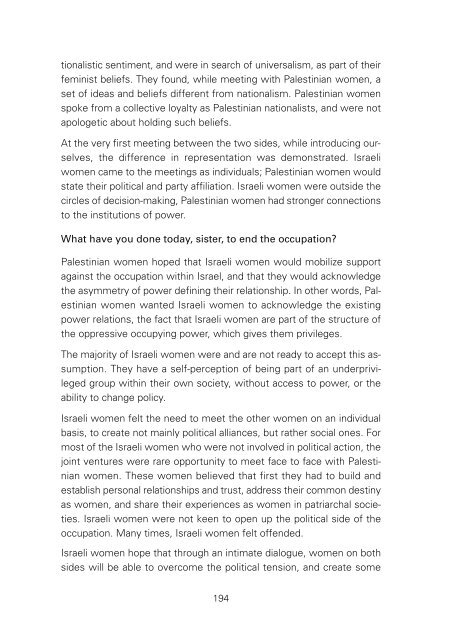The Contribution of Women to Peace and Reconciliation
The Contribution of Women to Peace and Reconciliation
The Contribution of Women to Peace and Reconciliation
You also want an ePaper? Increase the reach of your titles
YUMPU automatically turns print PDFs into web optimized ePapers that Google loves.
tionalistic sentiment, <strong>and</strong> were in search <strong>of</strong> universalism, as part <strong>of</strong> their<br />
feminist beliefs. <strong>The</strong>y found, while meeting with Palestinian women, a<br />
set <strong>of</strong> ideas <strong>and</strong> beliefs different from nationalism. Palestinian women<br />
spoke from a collective loyalty as Palestinian nationalists, <strong>and</strong> were not<br />
apologetic about holding such beliefs.<br />
At the very first meeting between the two sides, while introducing ourselves,<br />
the difference in representation was demonstrated. Israeli<br />
women came <strong>to</strong> the meetings as individuals; Palestinian women would<br />
state their political <strong>and</strong> party affiliation. Israeli women were outside the<br />
circles <strong>of</strong> decision-making, Palestinian women had stronger connections<br />
<strong>to</strong> the institutions <strong>of</strong> power.<br />
What have you done <strong>to</strong>day, sister, <strong>to</strong> end the occupation?<br />
Palestinian women hoped that Israeli women would mobilize support<br />
against the occupation within Israel, <strong>and</strong> that they would acknowledge<br />
the asymmetry <strong>of</strong> power defining their relationship. In other words, Pal -<br />
estinian women wanted Israeli women <strong>to</strong> acknowledge the existing<br />
power relations, the fact that Israeli women are part <strong>of</strong> the structure <strong>of</strong><br />
the oppressive occupying power, which gives them privileges.<br />
<strong>The</strong> majority <strong>of</strong> Israeli women were <strong>and</strong> are not ready <strong>to</strong> accept this assumption.<br />
<strong>The</strong>y have a self-perception <strong>of</strong> being part <strong>of</strong> an underprivi -<br />
leged group within their own society, without access <strong>to</strong> power, or the<br />
ability <strong>to</strong> change policy.<br />
Israeli women felt the need <strong>to</strong> meet the other women on an individual<br />
basis, <strong>to</strong> create not mainly political alliances, but rather social ones. For<br />
most <strong>of</strong> the Israeli women who were not involved in political action, the<br />
joint ventures were rare opportunity <strong>to</strong> meet face <strong>to</strong> face with Palestinian<br />
women. <strong>The</strong>se women believed that first they had <strong>to</strong> build <strong>and</strong><br />
establish personal relationships <strong>and</strong> trust, address their common destiny<br />
as women, <strong>and</strong> share their experiences as women in patriarchal societies.<br />
Israeli women were not keen <strong>to</strong> open up the political side <strong>of</strong> the<br />
occupation. Many times, Israeli women felt <strong>of</strong>fended.<br />
Israeli women hope that through an intimate dialogue, women on both<br />
sides will be able <strong>to</strong> overcome the political tension, <strong>and</strong> create some<br />
194








